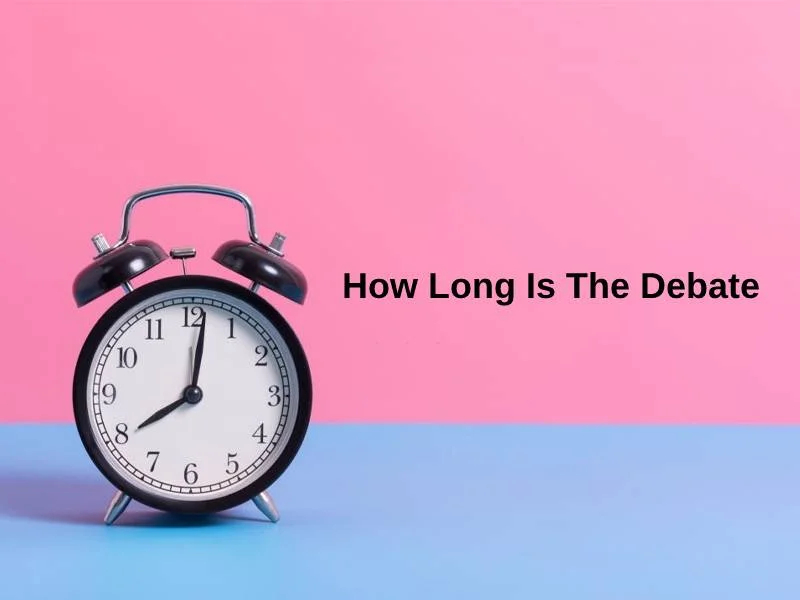Exact Answer: 10 Minutes to 7 Days
Debate is a form of discussion & exchange of ideas, thoughts, and opinions. In a debate, there are two individuals, groups, or sides. Usually, in the debates, the topic is chosen before the debate. If necessary, one can also even hold an impromptu or extempore type of debate.
The two groups or sides or individuals talk on behalf of either side of the topic. A neutral anchor or chairperson handles the proceedings of the debate. One can debate in support (or the positive aspect) of the issue, while the other can be against (or negative aspect) the topic.

How Long Is The Debate?
Debates always have a time limit. This time limit may differ from one debate to the other. For example, parliamentary debates can go on for days (with sufficient breaks in between), for the discussion of the bills proposed in the assembly.
The most famous presidential debates run from anywhere between 60 to 120 minutes. The presidential debate of 2020 ran for approximately 95 minutes. One must note that this debate is an example of a one-on-one debate. Similarly, even the vice-presidential debates run for around 60 to 120 minutes.
The TV debate shows run around 30 minutes to 1 hour. In these debates, a topic is discussed upon with the news host as the anchor. Various debate competitions have a time limit of 10 minutes to 3 hours, depending upon the number of participants, topics, and other crucial factors.
Student debates in schools & colleges may be as long as an hour or so. The sequence of the debate, rules, number of judges, and other metrics may vary from one debate to another. These metrics also may more or less influence the duration of the debate.
Nowadays, even businesses and especially startups use debate as a tool for brainstorming. These brainstorming debates may last from 10 minutes to 3 hours, and even more.
| Type Of Debate | Time Duration Of The Debate |
| Presidential & Vice-presidential | 60 to 120 Minutes |
| Parliamentary | 1 to 7 Days |
| TV Debates | 30 Minutes to 1 Hour |
| Student Debates | 10 Minutes to 2 Hours |
Why Is The Debate So Long?
A debate doesn’t end with a clear-cut conclusion. The judges or the majority can determine the winner of the debate under various criteria that they deem fit. The purpose of the debate plays a key role in determining the time limit.
The debate can be more or less broken down into three crucial phases, namely, the introduction, the discussion, and the cross-examination or cross-questioning. The time limit on these phases is determined by various criteria, factors, and metrics.
Usually, the introduction phase is the shortest one, where either the chairperson or neutral anchor, or speaker may introduce the topic. In some debates, the individuals or the teams can also introduce their point of view as the introduction.
The discussion phase is an exchange of ideas, thoughts, and information. This phase is a key factor in deciding the duration of the debate. The number of people expressing themselves and the number of opportunities they get to express their views play an important role in deciding the time limit of the debate.
The cross-examination or cross-questioning phase is the last phase before the debate is concluded either due to the time limit or by the chairperson or by a mutual truce. In this phase, either side tries to prove the opposition’s point vague, contradictory (to their own statements), hypocritical, or null & void.
There are factors like the number & duration of the breaks, audience questions & answers, and many other factors that also influence the time taken for the debate. Irrespective of these factors, it is highly unlikely that the debates run for more than 3 or 4 hours without any breaks. However, with the number of breaks placed strategically, the debates can go on.
Conclusion
Debates are an excellent form of information, thoughts, ideas, and viewpoints exchange. Without a set time limit the debates may go on & on. The time taken in these debates is influenced by various factors, criteria, and metrics.